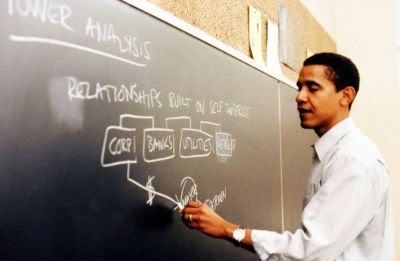Obama Admires Bush
Source: Reuters
By DAVID BROOKS
Published: May 16, 2008Hezbollah is one of the world’s most radical terrorist organizations. Over the last week or so, it has staged an armed assault on the democratic government of Lebanon.
Barack Obama issued a statement in response. He called on “all those who have influence with Hezbollah” to “press them to stand down.” Then he declared, “It’s time to engage in diplomatic efforts to help build a new Lebanese consensus that focuses on electoral reform, an end to the current corrupt patronage system, and the development of the economy that provides for a fair distribution of services, opportunities and employment.”
Shades of Alinsky…yes it’s coming…wait for it.
That sentence has the whiff of what President Bush described yesterday as appeasement. Is Obama naïve enough to think that an extremist ideological organization like Hezbollah can be mollified with a less corrupt patronage system and some electoral reform? Does he really believe that Hezbollah is a normal social welfare agency seeking more government services for its followers? Does Obama believe that even the most intractable enemies can be pacified with diplomacy? What “Lebanese consensus” can Hezbollah possibly be a part of?
If Obama believes all this, he’s not just a Jimmy Carter-style liberal. He’s off in Noam Chomskyland.
I could be wrong but I am wondering if there is an additional point here.
Actually social welfare is precisely where both Hamas and Hezbolah have a base of people power who support and follow them. They have taken from the pages of ‘community organizers’ to position themselves through providing ’services’ to obtain ‘democratic vote’ count to deliver legitimate power.
With “the development of the economy that provides for a fair distribution of services, opportunities and employment” the Lebanese Government TAKES the vehicle (services) that drives (empowers) the Hezbolah motor (constituency) away from them, giving it back to Lebanese.
Sound like a backyard chicago dealing?
I supposse it could work actually - except one hasn’t taken the fuel (hatreds) away that can be picked up at any service station (Mosque).
That didn’t strike me as right, so I spoke with Obama Tuesday to ask him what he meant by all this.
Right off the bat he reaffirmed that Hezbollah is “not a legitimate political party.” Instead, “It’s a destabilizing organization by any common-sense standard. This wouldn’t happen without the support of Iran and Syria.”
I asked him what he meant with all this emphasis on electoral and patronage reform. He said the U.S. should help the Lebanese government deliver better services to the Shiites “to peel support away from Hezbollah” and encourage the local populace to “view them as an oppressive force.” The U.S. should “find a mechanism whereby the disaffected have an effective outlet for their grievances, which assures them they are getting social services.”
I rest my obama- Alinsky -Diplomacy-case (However, as much as the plan also sounds like a Wright sermon to it’s congregation as an example of oppressors and oppressions, captives and captors - I have to wonder if the disaffected are ever satisfied and move on or do they just find new masters?)
Of course the US will pay for this Obama welfare plan - there and elsewhere.
The U.S. needs a foreign policy that “looks at the root causes of problems and dangers.” Obama compared Hezbollah to Hamas. Both need to be compelled to understand that “they’re going down a blind alley with violence that weakens their legitimate claims.” He knows these movements aren’t going away anytime soon (“Those missiles aren’t going to dissolve”), but “if they decide to shift, we’re going to recognize that. That’s an evolution that should be recognized.”
for the rest of the story: http://tinyurl.com/64nhfn
…I can’t quite figure out if I’m hearing a black anger and white resentment speech…
Ah, as far as I know Hezbollah and Hamas are both organizations who’s main charters, formation and purpose are the total destruction of Israel.
What legitimate claim is Obama talking about?
So Obama wants to sit down and talk with all these manics about their “legitimate claims”?
To do so would only “strengthen” any disclosed “weakness” wouldn’t it?
Obama: "Listen here, sweety. You peoples need to get some exercise, ride a bike, not eat so much, turn the temperature down in your house, give up striving for ambitions, share your prosperity, uncling yourselves from the koran, and do what your wives tell you to do!"
ut oh.




